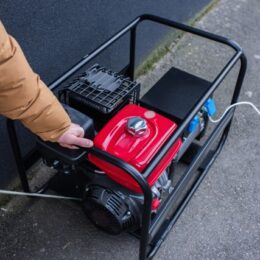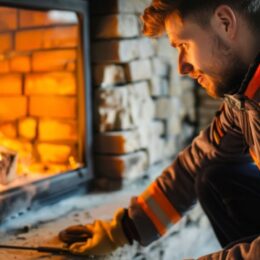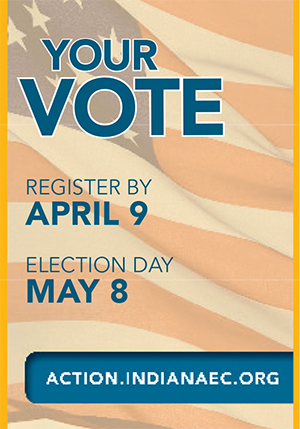 Political pundits across the country are keeping a close eye on the 2018 Senate race in Indiana, calling the outcome “too close to call” even before we know which Republican candidate will be challenging Democratic incumbent Joe Donnelly for his seat.
Political pundits across the country are keeping a close eye on the 2018 Senate race in Indiana, calling the outcome “too close to call” even before we know which Republican candidate will be challenging Democratic incumbent Joe Donnelly for his seat.
Who Donnelly, running unopposed in the primary, will face in the November election is anyone’s guess. Three candidates — Republicans Mike Braun, Luke Messer and Todd Rokita — will be battling it out in the May 8 primary elections.
Donnelly, who spent six years in the U.S. Congress, defeated former Indiana State Treasurer Richard Mourdock six years ago to claim Sen. Richard Lugar’s seat.
While Messer and Rokita, who currently serve in the U.S. House of Representatives, seek a new position on Capitol Hill, their congressional seats are up for grabs. In both districts, there’s a full field of candidates interested in those coveted positions.
Running in the Democratic primary in District 4 are Tobi Beck, Roger D. Day, Roland Ellis, Darin Patrick Griesey, Joe Mackey and Veronikka Ziol. Republican candidates in District 4 are State Rep. Jim Baird, former State Rep. Steve Braun (brother of Senate candidate Mike Braun), Kevin Grant, Diego Morales, James Nease, Tim Radice and Jared Thomas. Electric co-ops in this district currently served by Rokita are Newton County REMC, Jasper County REMC, Warren County REMC, Tipmont REMC, Carroll White REMC, Boone REMC, and Hendricks Power Cooperative.
In the 6th Congressional District, George T. Holland, K. (Jasen) Lave, Jeannine Lee Lake, Jim Pruett, Lane Siekman and Joshua Williamson are candidates for the Democratic nomination. Republicans in the race are Mike Campbell, Jonathan Lamb, Stephen MacKenzie, Jeff Smith and Vice President Mike Pence’s brother, Greg Pence. Among the electric cooperatives in this district currently served by Messer are Jay County REMC, NineStar Connect, Henry County REMC, Whitewater Valley REMC, RushShelby Energy, Bartholomew County REMC, Decatur County REMC, Jackson County REMC, Southeastern Indiana REMC and Clark County REMC.
The four candidates vying for Senate answered some key questions posed by Indiana Electric Cooperatives.
Three Republicans vie for Senate nod
Indiana electric cooperatives: What makes you the best candidate to serve as Indiana’s next U.S. Senator?
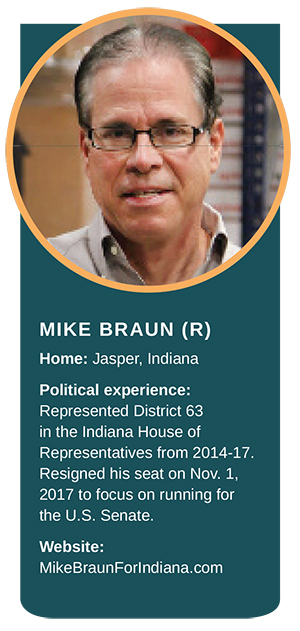 Mike Braun: I am running because Hoosiers are ready for leaders who can break the stranglehold career politicians have on the federal government. I will bring conservative change to Washington. President Trump needs reinforcements if he is going to drain the swamp in D.C. As founder and CEO of Meyer Distributing and owner of Meyer Logistics, I have employed thousands of Americans across the United States. My companies serve all 50 states and have locations in 38 states, with Meyer’s corporate headquarters located in Jasper, Indiana. I am running for the Senate because I believe Washington needs more people with experience in the private sector, not politics. I have spent my career building a business and creating jobs.
Mike Braun: I am running because Hoosiers are ready for leaders who can break the stranglehold career politicians have on the federal government. I will bring conservative change to Washington. President Trump needs reinforcements if he is going to drain the swamp in D.C. As founder and CEO of Meyer Distributing and owner of Meyer Logistics, I have employed thousands of Americans across the United States. My companies serve all 50 states and have locations in 38 states, with Meyer’s corporate headquarters located in Jasper, Indiana. I am running for the Senate because I believe Washington needs more people with experience in the private sector, not politics. I have spent my career building a business and creating jobs.
Here in Indiana, far too often we’ve seen factories close and jobs move to foreign countries, devastating communities and leaving families searching for options.
Luke Messer: In Congress, I’ve been a partner for President Trump, and I will go to the U.S. Senate to fight for Indiana’s families and move our country forward. I was raised by a single mom in Greensburg, Indiana, who taught me one of the most important lessons in life is to never quit. Right now, the U.S. Senate is quitting on Hoosiers. President Trump is working to pass the agenda the American people voted for, and the Senate is standing in the way almost every time. As your senator, I will be an ally for the President and make sure the Senate doesn’t quit on Hoosiers.
Todd Rokita: Hoosiers elected President Trump in 2016 to put Americans first and fight for the forgotten men and women of this country. It is time to send a conservative fighter to the U.S. Senate that will truly put Hoosiers first. In the House of Representatives, I have been a leader on education reform, promoting school choice and stopping Common Core. As vice chairman of the Budget Committee, I have worked to reform out-of-control federal spending, demand efficiency and accountability from government and put the United States on a path to a balanced budget. I’ve also been a leading voice for spending reform and rolling back excessive federal regulations that hurt small businesses and Indiana agriculture. As a member of the Transportation and Infrastructure Committee, I’ve brought over $5 billion of Indiana’s tax dollars back for roads and infrastructure.
As Indiana’s Secretary of State from 2003-2010, I implemented Indiana’s photo ID law to stop voter fraud, fought to reform the redistricting process to term-limit career politicians and modernized the office to provide Hoosier businesses with a better return on their state government.
What are rural America’s biggest challenges? How would you address them?
Braun: The biggest challenges facing rural America are keeping good-paying jobs and fighting the opioid crisis. Career politicians have promoted policies that allowed good jobs to leave America, with rural America being hit harder than most. As jobs have fled overseas, the politicians have sat idly by while opioid addiction began ravaging our communities. I will fight to bring jobs back and help those afflicted by opioid addiction.
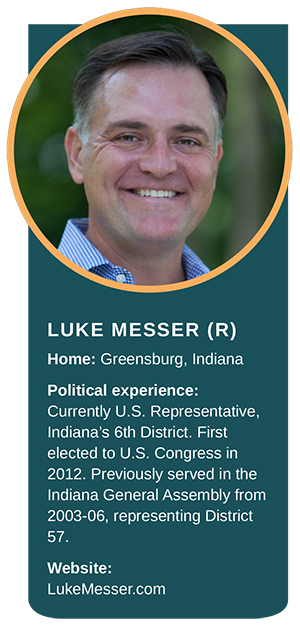 Messer: The Hoosiers I talk to across the state want to see good-paying jobs and a strong economy so they have their shot at the American dream. Unfortunately, for too many people today, that dream no longer rings true. Folks are working harder than ever, but not getting ahead. President Trump is working to revive the American dream, and his recent tax cuts were a great first step. In Indiana, Hoosiers are already seeing more jobs and more take-home pay. I’m excited to continue working with the president to advance policies that support Hoosier workers and grow our economy. That means reducing regulation that hinders growth, investing in our crumbling infrastructure, and ensuring Hoosiers have the skills and resources they need to be competitive in the modern economy.
Messer: The Hoosiers I talk to across the state want to see good-paying jobs and a strong economy so they have their shot at the American dream. Unfortunately, for too many people today, that dream no longer rings true. Folks are working harder than ever, but not getting ahead. President Trump is working to revive the American dream, and his recent tax cuts were a great first step. In Indiana, Hoosiers are already seeing more jobs and more take-home pay. I’m excited to continue working with the president to advance policies that support Hoosier workers and grow our economy. That means reducing regulation that hinders growth, investing in our crumbling infrastructure, and ensuring Hoosiers have the skills and resources they need to be competitive in the modern economy.
Rokita: As I travel to rural communities across the state, the number one issue I hear about is the opioid epidemic.
I’m proud to have worked with Trump to extend the national emergency for the opioid epidemic. The opioid crisis has impacted families all across our state.
Here is what Congress and the federal government can do to combat the opioid epidemic: we need the federal government, the Health and Human Services Department and federal law enforcement working with states and localities to crack down on doctors over prescribing opioids and companies pushing opioids outside of the law, expanding access to addiction treatment services and increasing enforcement. That’s why I voted for the Comprehensive Addiction and Recovery Act in 2016, and supported President Trump when he designated the opioid crisis a national health emergency.
We also need to build a wall and secure that border because 95 percent of the heroin in this country comes across that border. Tragedies like the HIV outbreak in Austin, Indiana, could be stopped by building the wall and cutting off the supply. I will stand with President Trump to build the wall and stop it.
Next, the federal government needs to create the environment for a growing economy. Hoosiers, and all Americans, in depressed communities hit hard by the opioid epidemic, need opportunity and hope, not welfare dependency and hopelessness. President Trump’s tax reform will help Hoosiers all across the state reach their economic potential.
Ultimately, where this issue needs to be addressed is at the community level. And this is also where we are seeing the best gains in fighting it. Churches, schools, community groups, local nonprofits, and, ultimately, families and friends, are the ones that will put an end to this epidemic.
How should Congress approach energy policy?
Braun: Energy independence is a matter of national security. I think Washington should work together to improve our energy efficiency and independence, which hasn’t been vastly overhauled in over a decade. I support efforts in Congress which increase our energy capabilities, such as drilling for more domestic oil and natural gas, opening more offshore drilling, and reducing regulations for the approval of natural gas pipelines.
Messer: I support an “all-of-the-above” energy strategy. Unfortunately, excessive government intervention has hampered our ability to remain a global energy leader. From the Clean Power Plan’s arbitrary rules to the effective ban on new coal power plants, to the maze of federal bureaucracy, the Obama administration’s mandates hurt our energy sector. I’m working with President Trump to roll back the Obama administration’s heavy-handed policies that hampered innovation and increased energy production costs. As your senator, I will support policies that promote the development of reliable and affordable energy for all Americans.
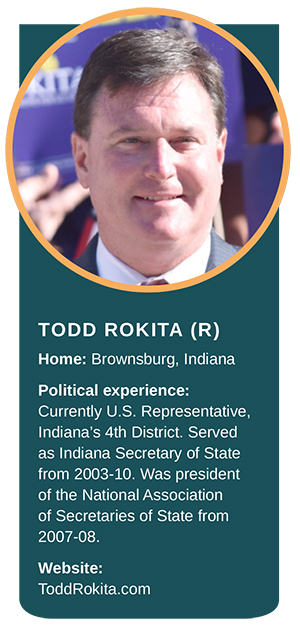 Rokita: We must always continue to pursue an all-of-the-above strategy to our nation’s energy needs, not only for our economy and for jobs, but also for our national security. Energy independence is a crucial part of our nation’s security.
Rokita: We must always continue to pursue an all-of-the-above strategy to our nation’s energy needs, not only for our economy and for jobs, but also for our national security. Energy independence is a crucial part of our nation’s security.
I have supported efforts by the EPA to grow our energy industry and create a diverse set of resources. Indiana produces coal, wind, solar and ethanol.
I supported S.J. Res. 24 in the 114th Congress which would overturn the Clean Power Plan (CPP) published by the Obama administration. The CPP would provide virtually no climate benefit but would lead to higher energy prices, particularly hurting the Americans who can least afford it.
I also support Interior Department actions under President Trump to boost oil, gas and coal production by repealing Obama-era regulations that govern fossil fuel production on public lands. One of the biggest moves so far, which I support, would reverse Obama’s tightened restrictions on leaks of methane from drilling wells, pipelines, and other infrastructure.
I also voted to open up areas for drilling that were previously off-limits. Thanks to the Tax Cuts and Jobs Act passed last December, some public lands in Alaska are now open to exploration.
How would you address the growing digital divide in rural Indiana and across America?
Braun: The digital divide puts rural America at a disadvantage. Limited access to broadband hinders educational opportunities and job growth. Improving the digital infrastructure in rural America must be a priority for leaders in Washington. We can make it easier to expand broadband access into rural areas by reducing regulations on providers and promoting market driven innovations.
Messer: The invention of the internet and the communication revolution has helped unleash an unprecedented era of growth and productivity the United States. While information is readily available like never before, too many in rural America are being left behind. Investing in rural broadband means investing in Hoosiers. Such investments can help the working mom go back to school at night, encourage the student to take an advanced science or math course, or empower the sick patient to receive telehealth care without having to drive hours to a doctor. I’ll continue to champion efforts to expand high-speed internet access, reduce regulatory barriers, and incentivize more private investment because it is an essential component to our national infrastructure.
Rokita: I have consistently worked to fund help close the digital divide. Providing access to broadband in rural communities is important. President Trump has also vowed to close the digital divide, and I support his efforts.
In January, I sent a letter to OMB Director Mick Mulvaney requesting $50 billion in funding in the president’s infrastructure plan. The administration listened to my request, as their proposal to Congress included the $50 billion that I suggested.
I also support improving rural broadband access by making it easier to deploy “last-mile” hardware to houses in rural areas to ensure access. I support changes to our regulations to make it easier for companies to get permission to lay fiber lines, put up cellular towers or install other broadband infrastructure.
Indiana’s rural communities have been affected by the growing “talent gap” in our workforce as many young Hoosiers leave for opportunities elsewhere. How would you address this issue?
Braun: Government is not the driver of new job creation or economic prosperity. And too often it gets in the way with onerous regulations and sky-high taxes. President Trump’s work to remove burdensome red tape and lower taxes for families and businesses are a start, but now is the time to double down on empowering the private sector and job creators. As a CEO, I know how important having a trained and educated workforce is to the success of a company and our economy. We must skill up our workforce and provide the training resources necessary so young Hoosiers can fill the good paying jobs being created by Indiana’s top business climate.
Messer: Indiana’s best asset is our people. Ensuring Hoosier workers have opportunities to succeed must be a top priority. That starts with creating a climate that encourages entrepreneurship, helps small businesses grow and attracts good paying jobs. I’m excited about President Trump’s leadership to cut taxes, eliminate unnecessary regulations, and promote common-sense policies that help Main Street. We can build on these successes by addressing challenges in our healthcare system, investing in our nation’s infrastructure and encouraging job training for in-demand fields here in Indiana.
Rokita: Right now, we are seeing a skills gap emerge in our country as employers are struggling to find employees who can work in high-demand jobs.
Overcoming the skills gap is a top priority of mine given his position on the Education and Workforce Committee. I voted in favor of H.R. 2353, the Strengthening Career and Technical Education for the 21st Century Act, which will help close the skills gap and set our workers up for future successes.
I also voted in favor of and cosponsored H.R. 4506, the Promoting Real Opportunity, Success, and Prosperity through Education Reform Act. It would reform our higher education system to focus more on developing the skills of Americans to set ready them for high-skilled jobs. We need to make sure that future generations are ready and able to fill or create jobs throughout the state and country.
It is also important, when talking about developing our workforce, that we protect against opioids and other drugs that have had such an impact on our communities. I have held dozens of meetings with local business owners who are unable to find enough workers for open positions who can pass a drug test.
What are the two biggest challenges facing our state? How would you address them?
Braun: We need a tax code that is simple and fair. We must repeal Obamacare, not repair it, to rein in costs and expand healthcare options. Market-driven solutions are the key to driving down costs and improving delivery. I have implemented changes in my own company that have saved employees money and improved their access to quality care. Infrastructure is vital to our national economic success. Politicians in Washington have neglected this issue for too long and I took the lead here in Indiana to deliver a long-term solution to fixing our infrastructure. I will be able to be lead on these two issues as a U.S. senator from day one. I have lived these issues as a businessman in the real world where we must find solutions to problems and not just talk about them.
Messer: Indiana is facing a skilled worker shortage and an opioid crisis. Whenever I meet with employers around the state, they tell me how they want to expand and hire new employees, but they can’t find qualified candidates to fill the role. At the same time, the state is in the middle of an opiod crisis that’s hurting Hoosier workers and devastating communities. Indiana’s best asset is our people. By investing in Hoosiers today, we can ensure that we have the talent and skilled workforce we need to continue to grow in the modern economy.
But the biggest challenge facing our state and our country is that we have a United States Senate that’s broken, and blocking common-sense reforms to support Hoosier workers and move our country forward.
Nearly 500 bills have passed the House since the president’s inauguration, but almost 400 of those are stalled in the Senate. As Indiana’s next senator, one of my top priorities will be fix the broken U.S. Senate so we can deliver for Hoosiers.
Rokita: Drug and opioid addiction is one of the biggest challenges facing Indiana. According to state estimates, the opioid crisis cost Indiana $250 million last year in lost productivity, medical costs, and other programs.
In 2016, 785 of Indiana’s 1,518 drug overdoses were related to opioids, this represents a nearly 300 percent increase over the number of opioid related overdoses in the state just six years prior.
I supported the Comprehensive Addiction and Recovery Act in 2016, which provided new grant money to state and local governments to establish programs to treat addiction and improve law enforcement programs.
Another challenge is ensuring that we are educating and teaching our children the skills that they need for a 21st century economy. Workforce development must always be a priority so Hoosiers have the tools they need to live full and fruitful lives.
I have chaired multiple subcommittee hearings on improving our education system to help improve apprenticeship programs, reform CTE education, and reform K-12 education.
Democrat Donnelly seeks second Senate term
Why should voters re-elect you to the U.S. Senate?
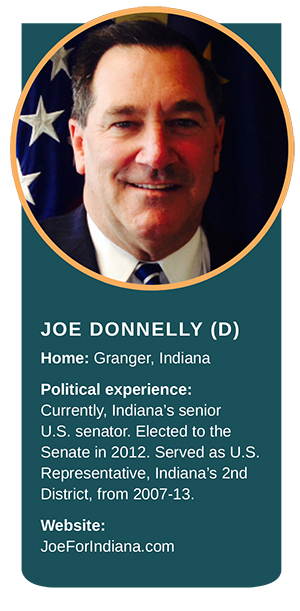 I’m running for re-election so I can continue working hard for Hoosiers and reaching across the aisle to deliver results for Indiana. Coaching my kids’ Little League teams led me to working on their school’s board, where I learned that real leaders listen. When I decided to run for Congress, I knew from that experience that things get done only when people work together. I’ve traveled to all 92 counties each of the last four years, listening to Hoosiers’ concerns, and they want someone who works for them. There are plenty of folks in Washington fighting for the far left or the far right — I’m willing to fight to deliver results for the folks in the middle. When we take Hoosier common sense to Washington, we can give more people a shot at the American dream.
I’m running for re-election so I can continue working hard for Hoosiers and reaching across the aisle to deliver results for Indiana. Coaching my kids’ Little League teams led me to working on their school’s board, where I learned that real leaders listen. When I decided to run for Congress, I knew from that experience that things get done only when people work together. I’ve traveled to all 92 counties each of the last four years, listening to Hoosiers’ concerns, and they want someone who works for them. There are plenty of folks in Washington fighting for the far left or the far right — I’m willing to fight to deliver results for the folks in the middle. When we take Hoosier common sense to Washington, we can give more people a shot at the American dream.
What are rural America’s biggest challenges? How are you addressing them?
As I travel around the state, Hoosiers tell me that the biggest challenge facing rural America is jobs. Here in Indiana, far too often we’ve seen factories close and jobs move to foreign countries, devastating communities and leaving families searching for options. I’ve tackled this issue head on by introducing the End Outsourcing Act, which would create new incentives to stop companies from sending jobs to foreign countries and to encourage companies to relocate outsourced jobs to rural communities, and I’ve been fighting for investments in infrastructure, especially rural broadband, so businesses have what they need to out compete global competitors. Together, working on issues like these, we can keep making things in Richmond, Jasper, and Huntington, and Hoosier families can enjoy good paying, middle class jobs.
I also hear from folks a lot about access to health care. We have 59 Hoosier counties that are considered underserved for primary health care, and we know just how important access to a family doctor can be when it comes to attracting businesses and families into an area. The lack of health care access also impacts our ability to respond to the challenges of the opioid epidemic. I have introduced bipartisan legislation to address this issue that would address the shortage of addiction treatment providers in rural areas and direct several USDA Rural Development programs to focus on developing the facilities needed for things like telemedicine and better supporting substance abuse prevention and education programs.
We also have to understand how these issues are connected — the rise of drug overdoses in East Central Indiana following the loss of factory jobs there; that Scott County, which suffered Indiana’s worst HIV outbreak, was also home to our state’s worst child food insecurity rates; or the need for rural broadband deployment to increase telemedicine in underserved areas — and address them properly.
How do you think Congress should approach energy policy?
I support an all-in American energy policy, which creates jobs right here in Indiana, reduces our dependency on foreign oil, and strengthens our national security. My all-in approach includes coal, ethanol, biodiesel, oil, wind, and solar. In Congress, I have worked to streamline permitting and approvals for energy infrastructure, supported the RFS, introduced legislation to allow E-15 ethanol to be sold year-round, and opposed regulations that would unfairly target the coal industry.
How are you addressing the growing digital divide in rural Indiana and across America?
During my farm bill listening tour of the state, Hoosiers told me that the lack of broadband service in rural Hoosier counties continues to be a major concern.
The 2014 farm bill, which I helped write as a member of the Senate Agriculture Committee, included provisions to deploy an ultra-high speed internet pilot program in rural areas, and I am fighting for further investment in rural broadband through USDA’s Rural Utilities Service. In addition, I have worked with a bipartisan group of senators to pressure the FCC to continue their efforts to deploy broadband in rural communities. We need to push to ensure broadband reaches all corners of our state — to grow Hoosiers’ businesses, to help safeguard access to health care through telemedicine, and to connect all Hoosiers with the rest of the world.
Indiana’s rural communities have been notably affected by the growing “talent gap” in our workforce as many young Hoosiers leave for opportunities elsewhere. How are you addressing this issue?
One of Indiana’s biggest challenges is finding skilled workers to fill the jobs Hoosier employers want and need to fill. In 2014, my AMERICA Works Act, which helps address this “skills gap,” was signed into law. My law would modify federal training programs to place a priority on those programs and certifications that were in demand by employers. I have also introduced legislation to require the Department of Labor to develop a strategy to address this gap and to invite employer involvement in worker training. I will never stop working on skills creation for our Hoosier workers.
What are the two biggest challenges facing our state? How are you addressing them?
When I talk to Hoosiers, they tell me they are focused on their families and just want to work hard for them. We need to make sure that every Hoosier can find and keep a good-paying job, take care of their families, and retire with dignity and health.
A good example is in the story of the Miners Protection Act, which is now law. In 1946, the United Mineworkers were promised by the federal government that their health benefits would be there when they retired. So many Hoosier miners went to work, providing our state with energy, and expecting their families to be protected by the promise. But when some of the companies went bankrupt, those benefits evaporated. I helped author the bill to ensure retired miners received the health benefits they earned. My role is to listen, as I did with the miners. I am succeeding in my job as your senator when I take your ideas and suggestions to Washington and fight for them.

